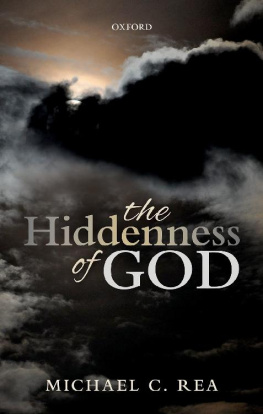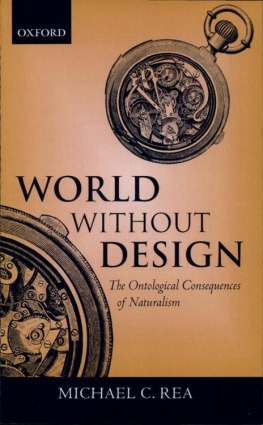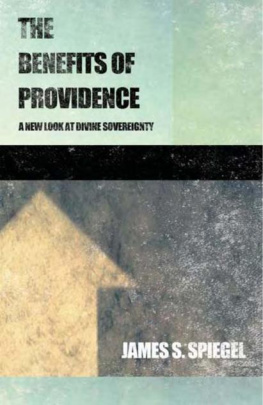The Hiddenness of God
The Hiddenness of God
Michael C. Rea
Great Clarendon Street, Oxford, OX2 6DP, United Kingdom
Oxford University Press is a department of the University of Oxford. It furthers the University's objective of excellence in research, scholarship, and education by publishing worldwide. Oxford is a registered trade mark of Oxford University Press in the UK and in certain other countries
Michael C. Rea 2018
The moral rights of the author have been asserted
First Edition published in 2018
Impression: 1
All rights reserved. No part of this publication may be reproduced, stored in a retrieval system, or transmitted, in any form or by any means, without the prior permission in writing of Oxford University Press, or as expressly permitted by law, by licence or under terms agreed with the appropriate reprographics rights organization. Enquiries concerning reproduction outside the scope of the above should be sent to the Rights Department, Oxford University Press, at the address above
You must not circulate this work in any other form and you must impose this same condition on any acquirer
Published in the United States of America by Oxford University Press 198 Madison Avenue, New York, NY 10016, United States of America
British Library Cataloguing in Publication Data
Data available
Library of Congress Control Number: 2018930847
ISBN 9780198826019
ebook ISBN 9780192560438
Printed in Great Britain by Clays Ltd, St Ives plc
Links to third party websites are provided by Oxford in good faith and for information only. Oxford disclaims any responsibility for the materials contained in any third party website referenced in this work.
To
Eleonore Stump
Preface
This book is a significantly expanded and revised version of my 2017 Gifford Lectures at the University of St. Andrews, entitled Though the Darkness Hide Thee: Seeking the Face of the Invisible God . It is a book that I have been wanting to write for a very long time.
My first real confrontation with the problem of divine hiddenness as a challenge to faith came from a friend during my first or second year in college. We had gone to church together and afterward, sitting in my parents kitchen, we got to talking about various kinds of faith struggles. Eventually she broke down in tears, saying God is supposed to be my heavenly father. So why cant he just whisper I love you once in a while? Later, during my first semester in graduate school (in fall 1991, just two years before the publication of J. L. Schellenbergs landmark book on the topic), Tom Morris introduced me to a philosophically more rigorous version of the problem to which my friend had given voice just a few years previously. It has been on my mind in one way or another ever sincesometimes in its guise as a purely philosophical objection to theistic belief, but more often as a kind of pastorally and existentially important theological problem for religious believers (friends, loved ones, and, often enough, myself as well) stricken by unsatisfied longing for some kind of experience of the love and presence of God.
I began work in earnest on the hiddenness problem about a decade ago, shortly after the publication of the private writings of St. Teresa of Calcutta under the title Come Be My Light . I now think that my earlier efforts on this topic (two scholarly papers and one tailored more for popular audiences, all listed in the references at the end of this book) embody some important misunderstandings and misreadings of the philosophical work that had been done (most notably by J. L. Schellenberg) in appealing to divine hiddenness as evidence against the existence of God; but the theological ideas in those earlier papers, underdeveloped as they were, I still mostly stand by. The most substantial of these theological ideas have found their way in more developed form into various chapters of the present book. And, thanks to some significant help from some of the friends and colleagues listed in the acknowledgments, I am hopefully optimistic that I have now managed to correct my earlier misreadings and misunderstandings.
For quite some time now it has seemed to me that the hiddenness problem needs to be approached, by Christians anyway, with attention not just to relevant issues in epistemology, ethics, and philosophy of religion (the philosophical sub-disciplines whose literatures most substantially intersect with the literature on the hiddenness problem) but also with attention to scripture, tradition, and matters theological. Accordingly, I am inclined to prefer an interdisciplinary approach to the hiddenness problemone that is informed not just by ideas and insights in the relevant philosophical literature, but also ideas and insights drawn from theology and biblical studies. I hope that I have managed to do justice to this preference in this book.
In the part of his will that designated his intentions for the Gifford Lectures, Lord Gifford stipulated that the lectures are to treat the topic of natural theology in the widest sense of that term; and he expressed the desire that lecturers treat their subject as a strictly natural science, the greatest of all possible sciences without reference to or reliance upon any supposed special exceptional or so-called miraculous revelation. A few people who know this about the Gifford Lectures, and who also knew that I was inclined to approach the hiddenness problem in the way that I just described, asked me how I would be presenting that kind of project as Gifford Lectures. Much has been written (mostly, but not entirely, in the prefaces and introductions of the books people have produced in the wake of their own Gifford Lectures) about what one must do, or is permitted to do, in trying to fulfill the task set for a Gifford Lecturer. Here, then, are my own thoughts about how the present project meshes with what is written in Lord Giffords will.
Despite his stated desire that lecturers treat their subject as a strictly natural science, neither philosophy nor theology are nowadays understood to be natural sciences. And, as other Gifford Lecturers (most notably, Alasdair MacIntyre) have pointed out, what Lord Gifford most likely envisioned in expressing this desire was, in any case, probably very different from what any contemporary reader of those words would envision. Be that as it may, philosophy as done in the so-called analytic style is nowadays often regarded as being at least methodologically continuous with the natural sciences; and the burgeoning field of analytic theology aims to treat its subject matter, the subject matter of theology, with precisely the same science-like, theory-building ambitions and methods that characterize the best instances of analytic philosophy. Insofar as they represent the best that their discipline has to offer, analytic theologians are, in the first instance, sincere lovers of and earnest inquirers after truth about God, just as Lord Gifford hoped that his lecturers would be; and they aim to build, or contribute to building, robust explanatory theories about theological matters by way of methods that in many ways resemble those of the natural sciences, especially in their prioritization of precision, logical rigor, and theoretical virtues like simplicity, explanatory power, fit with relevant data, and the like. It is my hope, therefore, that insofar as my lectures in 2017, and the book you have before you now, count as instances of analytic theology, they will accordingly be recognized as importantly faithful to Lord Giffords stipulations, even if our visions about what exactly it would be to treat theological matters scientifically are rather different from one another.












